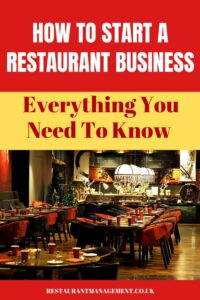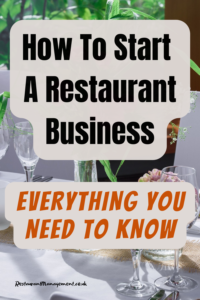Last Updated: 04 July 2024
How To Open A Restaurant With No Experience
If you’re thinking about starting a restaurant, there are a few things you need to know. In this article, we’ll outline the steps on How To Start A Restaurant Business and everything you need to know to get your business up and running fast.
Let’s outline the steps you need to take to get your business up and running and provide tips on how to make it successful. You’ll also need a business plan that will help you track your progress and make informed decisions about your future. Ready to get started? Let’s go!
Although opening a restaurant might be a challenging prospect, there are a few things you can do right from the start that will help ensure its success.
A business plan is essential for any restaurant start-up, it is a blueprint for success especially if you open a restaurant with no experience. A restaurant business plan can be used to assess your business idea, chart the course to achieving profitability and map out the necessary steps to reach your goals.

Restaurant Business Plans
There are many types of restaurant business plans, but basically, they fall into one of three categories:
- Startup planning: Startup plans typically cover how you’ll get your restaurant off the ground and operational.
- Growth-stage planning: growth-stage plans focus on growing revenues while maintaining profitability;
- Recapitalization planning: recapitalization plans are aimed at securing new funding for a business to expand rapidly.
The best business plan is tailored to your individual business needs and will reflect the unique aspirations, challenges, and opportunities of your particular endeavour.

What Is Required To Open A Restaurant In UK?
While there is no clear roadmap to success, our guide can give you a head start on what to expect when starting up your restaurant. With the right knowledge, it won’t be long before you’re famous for serving mouthwatering dishes in your new restaurant.
That being said, a successful business always involves time and effort. And if all goes well? You might just end up opening more than just one restaurant.
Furthermore, there are some essential elements that all restaurant business plans should include if they want to open a restaurant successfully in the UK:
- A clear overview of what you’re trying to achieve. This includes:
- setting out your target market,
- describing the product or service you’ll offer and
- identifying any key competitors – both locally and nationally.
- A realistic timetable for achieving your goals. This will allow you to track progress, assess when unexpected obstacles might crop up and adjust your plans accordingly.
You’ll also want to provide explanations for any delays or changes in schedule, as this will reassure potential investors or partners that you are credible and can deliver on your promises.
- Estimated costs and revenues – both short-term and long-term – along with a breakdown of what will be required to achieve each goal. Short-term costs typically include things like employee wages, procurement fees and startup costs. Long-term expenses might include the cost of expanding your business (in terms of premises, marketing and infrastructure) or developing new products or services. Revenues can be generated through charging customers for goods and/or services, selling shares in the company or generating income from licensing agreements.
- A strategy for increasing market share. This will involve identifying any key areas where you could improve your offering – either by upgrading existing products or introducing new ones – as well as creating a promotional campaign that will resonate with potential buyers. You’ll also need to think about ways to reduce costs so that you can compete with larger, more established rivals.
- A plan for obtaining necessary funding. This will involve detailing what steps you’ll need to take to secure angel or venture capital as well as outlining the terms and conditions of any such deal. You’ll also want to outline a contingency plan in case things don’t go according to plan – something that could include reducing staff or selling assets. It’s also important to quantify how much money you think you’ll need to get up and running as well as an estimate when – if at all –you might be ready for profitability.
- Your financial analysis and forecasts ..You’ll need detailed information on your business’ income and expenses, as well as projections of future trends. This will help you make informed decisions about where to allocate resources –both now and in the future and help ensure that your company remains financially viable long-term files.
- Your timeline and budget. You’ll need to indicate when you expect your project to be complete, as well as an estimate of how much it will cost. This information will help ensure that everyone is on track and that the final product meets your expectations.
- A timeline for achieving key milestones. This will include a timetable for developing new products or expanding your customer base, as well as the date by which you expect to achieve profitability.
- How you will respond to changes in the marketplace. You’ll need to outline how you’ll react when competitive pressure mounts or customer preferences shift, as these can both prove challenging times for businesses. You may also want to consider implementing a marketing budget that takes such fluctuations into account.
- A strategy for pricing your goods and services. Your prices should be based on what you believe is an appropriate level of margin – something that can be modified depending on market conditions – plus factors such as competitive pressure and the amount of effort required to produce and deliver the product or service.

- Strategies for marketing your business. You’ll need to outline which channels you’ll use to market your products and services, as well as the budget you’re willing to commit to each one. You’ll also want to provide information on the type of customers you’re targeting and the anticipated results you hope to achieve.
- Your marketing strategy. You’ll need to lay out a plan for how you will target your customers and achieve results. This may include creative campaigns, targeted advertising or even the introduction of new products or services. You’ll also need to provide an estimate of how much it will cost you to implement your strategy.
- Marketing materials. Make sure that all marketing materials, such as brochures and web pages, contain accurate information about your company and the products or services you offer.
- Business license. This document will identify you as a legitimate entity and protect both you and your clients from potential legal trouble. Check to make sure that you comply with local business regulations. This includes having the appropriate licenses, permits, and insurance coverage in place.
- How you will protect intellectual property (IP). You’ll need to outline how you plan to prevent others from using your intellectual property without consent, as well as the measures you’ll take to identify and enforce intellectual property rights.
Unveiling the Secrets of Restaurant Management in the UK: Everything You Need to Know
- How you will respond to customer complaints. You’ll need to set up a process for handling complaints, whether they’re related to product quality or sales behaviour. You’ll also want to make sure that your response times are reasonable – something that can be harder than it sounds when dealing with irate customers!
- How you will protect your valuable information. You’ll need to outline how you’ll keep your customer and employee data safe, as well as any proprietary information that’s important to your business. You may also want to consider setting up a security plan for computer systems and sensors.
- Detailed product specifications and drawings. You’ll need to provide detailed specifications for your products or services, as well as clear drawings that detail how they will be assembled or used. This information can help ensure that your customers receive the exact product they ordered –and no more- and that installation is smooth, without any hitches.
- Proofs of materials and equipment. You’ll need to provide proof of the materials and equipment you will use in your project, as well as a breakdown of how much each component will cost. This information can help ensure that your project is completed on time and within budget.
- You’ll need to provide names and contact information for at least three individuals who can attest to the quality of your work. This will help ensure that you’re getting the most qualified people on board with your project.

- You’ll want to make sure that you have appropriate insurance in place for any projects you undertake now and in the future, particularly if things go wrong. Ensure that your business is properly insured against a variety of risks, including property damage, personal injury, and business interruption. This protection can cover also loss or damage caused by accidents, natural disasters or acts of vandalism:
- Liability insurance. In addition to worker’s compensation, make sure that you have liability insurance in place. This coverage will protect you from any lawsuits that may arise as a result of an accident on your project.
- Property damage insurance. Property damage insurance will cover any costs that may be incurred as a result of accidents on your project, such as repairing or replacing damaged property.
- You’ll want to have a signed contract between yourself and the people who will be working on your project whether they are employees or subcontractors. This document will outline what is expected of both parties, as well as specify how payment will be handled should things go wrong.
- Legal documents. Make sure you have up-to-date versions of all applicable contracts, licenses, and permits.
- Employee handbooks. Make sure that all workers are aware of the company’s policies and procedures, including guidelines for handling conflict, harassment and unauthorized absence.
- Employee benefits. In addition to health insurance, make sure that your employees are covered by retirement plans, unemployment insurance, and other types of benefits.
- Worker’s compensation. If any workers are involved in your project, they will most likely require worker’s compensation. Make sure you have this coverage in place before starting work and keep updated on any changes that may need to be made.
- Safety equipment. Make sure that all workers are wearing proper safety gear, including helmets, goggles and gloves. Not only will this help protect them from injuries, but it can also reduce the chance of accidents causing property damage or lost time at work.
- Health and safety documentation. Keep health and safety documentation close at hand in case of an emergency. This information should include copies of all the safety gear that has been worn by workers, details about emergency procedures, and contact information for local authorities if there is an incident.
- Conflict of interest policies. Make sure that all employees understand the company’s conflict of interest policy and adhere to it.
Related Articles:
- Maximising Energy Efficiency In Restaurants
- Make More Money With a Career in Restaurant Management
- Restaurant Market Analysis: Unlock The Secret To Abundant Sales
- Unveiling the Secrets of Restaurant Management in the UK: Everything You Need to Know
- Unlock Success: Harnessing The Potential Of The Best Restaurant POS Systems
- Tax ID number. This number will allow you to keep track of your income and expenses, as well as make sure you’re fully reporting all income and deductions when filing taxes.
- Plans and procedures for handling disputes or disasters.
- Backup systems. Have a plan in place in case of an emergency that requires the use of backup systems, such as disabling computer files or restoring data from backup tapes.
- Procedures for closing down the business temporarily.
- Inventory records. Keep accurate logs of your inventory levels so you can track any changes and make adjustments as needed.
- Accounting information. Make sure to keep up with your accounting records so you can properly reflect the financial status of the business.
- Procedures for dealing with theft or other security breaches.

CONCLUSION
We hope you found our guide on how to start a restaurant business successfully informative and inspiring. Many new restaurants fail because they need to pay more attention to fundamental steps. Our tips will keep you focused on what truly matters – running an exceptional restaurant. Avoiding common start-up mistakes and crafting a solid business plan, which is the backbone of your venture. Once you have these essentials in place, you’re ready to begin!
By following these valuable insights into starting your dream business, you’ll be well-equipped to navigate the challenges ahead. And remember, if you ever feel uncertain, there are professional agencies ready to assist you through every step of your new venture, providing the support and guidance you need.
With proper planning and preparation, your new venture cannot only survive but also thrive.
Unlocking Success: Launching Your Fast-Casual Restaurant In The UK
Frequently Asked Questions and Answers
What is the startup cost for a restaurant?
The startup cost for a restaurant can be highly variable, dependent on location, size, and concept. Typically, the range spans from £50,000 to £1 million or more. This figure includes expenditures like leasing a space, acquiring equipment, securing licenses, interior design, staff salaries, and initial inventory. Conducting a meticulous feasibility study and creating a detailed budget are essential steps to gain a precise understanding of the financial commitments involved.
How much does it cost to open a restaurant in the UK?
Opening a restaurant in the UK involves diverse expenses. On average, the total cost can fall between £125,000 to £500,000 or more. This includes rent, licenses, interior design, kitchen equipment, initial staff salaries, marketing, and working capital. The location within the UK and the type of restaurant significantly influence the overall investment. Market research and seeking professional advice are prudent steps to ascertain accurate cost estimates.
What do you need to open your restaurant?
To successfully open your restaurant, you need to consider several key elements:
- Business Plan: A detailed plan outlining your concept, target audience, and financial projections.
- Legal Requirements: Get the correct permissions and papers you need, like certificates for food cleanliness and licenses to sell alcohol.
- Location: Choose a suitable and strategically located space that aligns with your restaurant concept.
- Interior Design: Create an inviting ambience that complements your brand and attracts customers.
- Equipment: Invest in quality kitchen equipment, furniture, and technology tailored to your restaurant’s needs.
- Staff: Assemble a skilled and dedicated team, including chefs, servers, and administrative staff.
- Marketing: Develop a robust marketing strategy to promote your restaurant and attract customers.
Do you need a Licence to run a restaurant?
Yes, a license is a prerequisite for running a restaurant in the UK. The license type required depends on various factors, including whether you plan to serve alcohol. The main licenses include:
- Premises License: Essential for selling alcohol, providing late-night refreshments, or offering entertainment.
- Food Hygiene Certificate: Mandatory to ensure compliance with hygiene standards in food preparation and handling.
- Public Liability Insurance: Often required to protect your business and customers in case of accidents.
It’s imperative to thoroughly research and understand the specific licensing requirements for your restaurant, as non-compliance can lead to legal issues and business disruptions.



Comments are closed.